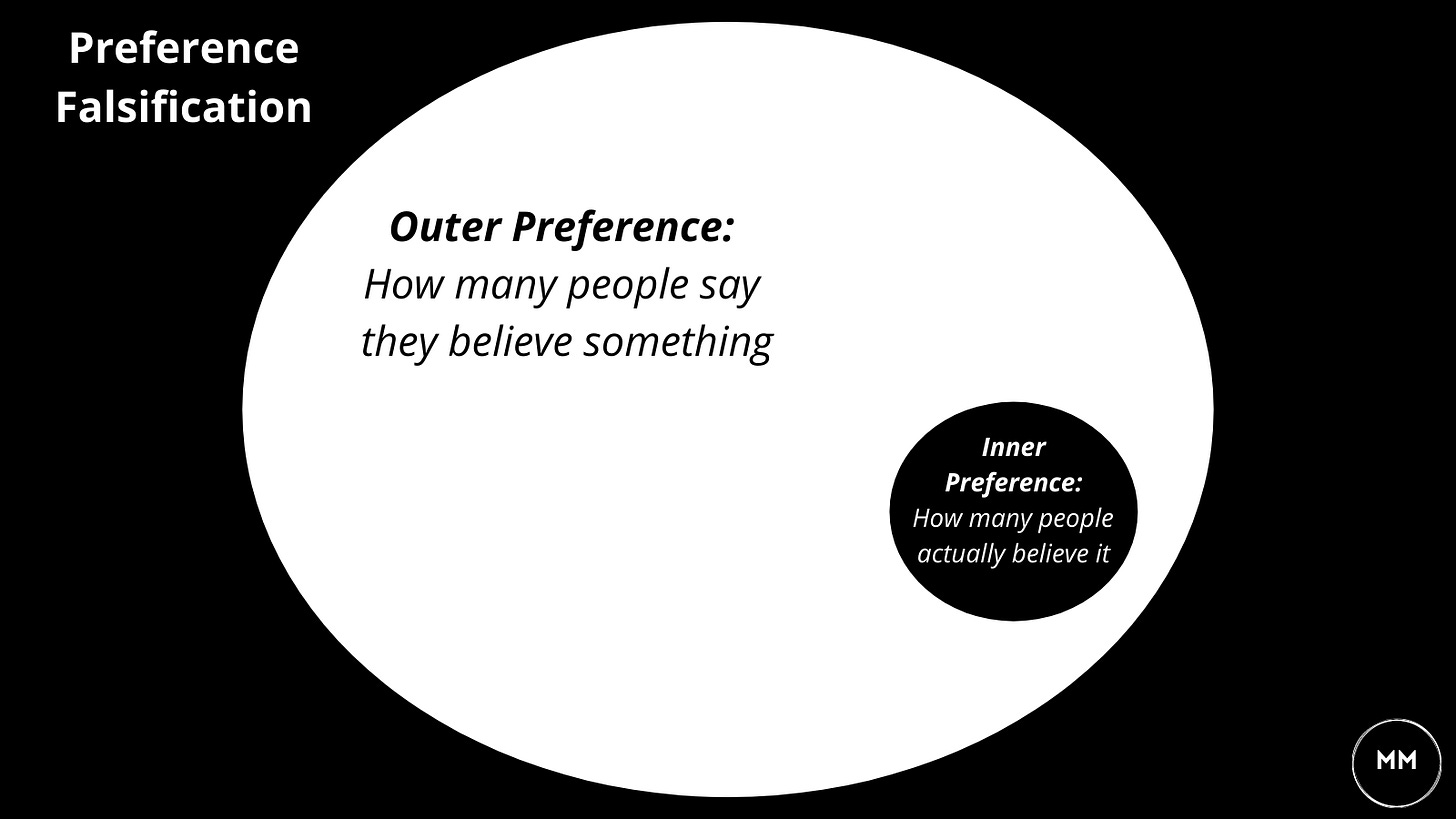Revolutions, political correctness, and Claudius from Hamlet.
What do all these often have in common? What fuels them?
Today’s mental model—preference falsification.
What people say differs from what they think. That is to say, their communicated preference is different from their inner, true preference.
They say a public lie that doesn’t match their private truth.
This is the theory of preference falsification.
Timur Kuran, a Turkish American professor of economics and political science, put forth the phenomenon of preference falsification in his book Private Truths, Public Lies. People’s vocalized preferences are subject to social influence. Timur describes how this social pressure influences individuals to tailor their beliefs to what is socially acceptable which, in turn, results in two preferences— an inward, true, and outward, tailored, preference.
This distortion of preference leads to views being overstated relative to what is actually true. With this idea of preference falsification in mind, it is not hard to conceptualize different phenomenons of the world at large.
Preference Falsification in 20th Century
Preference falsification sheds light as to why unanticipated revolutions occur.
Reflecting on the political regimes of the 20th century elucidates this. People gave blissful praise for their leaders Stalin, Saddam Hussein, Chairman Mao. Perhaps, this is what people actually felt, and they were singing these songs of praise genuinely. Sure, this may be true for some, but is that what most people really thought?
With hindsight, we can say certainly not.
Social pressures, mild or strong, play a role in creating the preconditions for preference falsification to arise. Humans are hyper-social creatures and easily influenced. This is shown through the Asch conformity tests which certainly relate to preference falsification. All the leaders above elicited intense pressures on their corresponding populations.
Saddam Hussein held a Ba’ath Party meeting in 1979. During the meeting, he proclaimed he uncovered a conspiracy against his leadership and had a party leader begin reading the names of conspirators in front of the crowd. Some ~60 something people, whose names were read for treason, were escorted out of the meeting. Many were executed. Those whose names weren’t read did the executing. Essentially a tool to reinforce the individual commitment to this external reality. After this, the external preference falsification is calcified as it is made clear any opposing preferences are not welcome.
In the surviving videos, the fear in the crowd is palpable; individuals begin to proclaim support for their leader Saddam in an almost show-like fashion. It’s quite clear that the external preferences of the crowd are not the crowd’s private preferences.
However, inner preferences don’t disappear, they are just suppressed. As illustrated above, preference falsification may lead to scenarios where many people may have a similar unspoken, inner truth.
When many people have similar suppressed views, it seems a time clock starts until someone speaks his private truth publicly. If done timely, and with a bit of luck, that individual will represent the many others too timid to speak and a shift might begin.
Oh Shakespear
As it turns out, the concept of preference falsification has been around for a while.
“My words fly up my thoughts remain below. Words without thoughts never to heaven go"
— Shakespeare via Claudius in Hamlet
In Hamlet, Claudius recites these words in an attempt to pray. However, he is unable to say what he feels. Unbeknownst to Claudius, Hamlet, who originally came to kill Claudius, watches him. As he watches Claudius, Hamlet’s mind is changed and he doesn’t kill the king.
Claudius’ words saved him—in the near term. But how does the play end?
Basically, with everyone dead.
Spoken words that hold no truth have no hope of achieving higher good. There is a price of speech but a greater price of silence.
Preference Falsification Today
Preference falsification seems closely knit to the idea of political correctness. What is the difference between political correctness and just correctness? It would seem that inner preferences have to be crafted to fit the external world.
As the political environment has become increasingly contentious, it now resembles something of hostile tribalism. If the individual’s thoughts don’t fit nicely into a broader narrative, he is ostracized. When did being reasonable become untenable?
The more pervasive political correctness the more pressure is exerted, intentionally or not, on inner preferences. What sort of free society do we live in if people don’t feel free to speak their minds?
Takeaways
There are many examples of preference falsification, both historically and today. For as long as man has had peers, he’s likely had private and public preferences.
By understanding preference falsification, we can hope to better understand the world around us. Better yet, we can work to create conditions where it doesn’t surface.
After all, if we can’t talk about things then we can’t solve them.
Cliffhanger: What’s coming up in the next couple of weeks
On-Deck: Mimetic Desire: Fashion, Ideas, TikTok, and Dating: People want what other people want.




